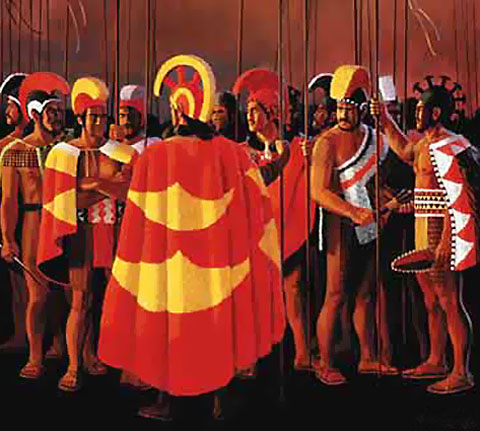by Juan Wilson & Linda Pascatore
4 March 2007 - La 'Eha o Malaki, 'Elua Kaukani me 'Ehiku
This
series is derived from adult education classes in conversational
Hawaiian given by the Kauai District of Education at Waimea High School
by Kumu (teacher) Kamakua Kahale. She is a young Niihauan who speaks
fluent Hawaiian.
See the introduction article for conventions we are using relating punctuation and spelling: Island Breath: Hawaiian Language Intro
In class #2 we extended our counting from 10 into the thousands and learned how to express the dates of the year.
We
will now learn some of the pronouns and articles. We will see how they
relate to counting and a different sense of plurality. In addition, the
pronouns make inclusive and exclusive references determining if the
person being addressed is a member of the those referenced. In many
ways these are details of language more subtle than
similar language usage in English.
PRONOUNS
As in English there are First, Second and Third Person pronoun references. Note
that the Hawaiian plurality destinguishes between singular (one), dual
(two) and more than two (several). Vestiges of LUA=TWO and KOLU=THREE
are built into the suffixes of these pronouns. In this way more complicated than English. Another
subtlty in Hawaiian is the specification of whether the addressee is included in the plural form. The exclusive form does not include addressee, and the inclusive form of the pronoun does.
As
a result, many learning Hawaiian have difficulty learning this aspect
of the language. Other aspects of the language are more simple than
English. We offer this reference to pronouns so that we can start
building sentences with subjects and objects. The following is an
extensive list of pronouns, with a shorter version of major pronouns
listed at the end of the lesson.
First Person The exclusive form does not include addressee
au = I (singular subject)
a'u = me (singular object)
ko’u= my, mine, I have (posessive singular) mine alone as in "my wife"
o'u = my, mine (posessive singular)
maua (ma-lua) = we two "she and I" (exclusive dual)
makou (ma-kolu) = we all, more than two (exclusive plural)
kaua (ka-lua) = we "you and me" (inclusive dual)
kakou (ka-kolu) = we"all of us" (inclusive plural)
Second Person
ko kaua (ko ka-lua) = our "your and my" (posessive inclusive dual)
ko kakou (ko ka-kolu) = our "your and our" (posessive inclusive plural)
ko maua (ko ma-lua) = our "his/her and my" (posessive exclusive dual)
ko kakou (ko ma-kolu) = our "their and my" (posessive exclusive plural)
'oe = you (singular)
'olua (o-lua) = you. "you two" (plural - two people)
'oukou (ou-kolu) = you, "you guys" (plural - more than two)
kou = your (posessive singular) o-form
kau = your (posessive singular) a-form
ko 'olua = your (posessive dual)
ko 'oukou = your (posessive plural)
Third Person
'oia = he/she (singular)
kona = his/her (singular posessive)
laua (la-lua) = they, them, "those two" (dual - two people)
lakou (la-kolu) = they, "those guys" (plural - more than two)
ko laua (ko la-lau) = their "his & her" (poessessive dual)
ko lakou (ko la-kolu) = their (poessessive plural)
PARTICLES
ka (ke) = the (singular) definate as in "THE book"
he = a (singular) indefinite
na = the (plural)
o = subject marker
i (ia) = object marker (at, in, on, to)
e = vocative (identifies addressee) "E, Keoni" = "Hey, John, I talkin' to you"
me = with
ke-ia = within my reach
ke-na = within your reach
ke-la = outside our reach
Vocabulary
Grayscale
keokeo = white
ahinahina = gray
eleele = black
Rainbow
ulaula = red
alani = orange
melemele = yellow
omaomao =green
polu = blue
poni = purple
Miscellaneous
akala = pink
gola = gold
makue = brown
Shades
wai hooluu = dye tint, hue
ahiehie = weak (light)
hapa = medium (half)
ikaika = strong (dark)
uli = deep (intense)
It
would be difficult to learn the use of these pronouns in one reading.
Use this lesson as a reference. Learn just a few elements now. A
simplified list of pronouns similar to English might include the
following:
au = I (singular subject)
'oe = you (singular)
'oia = he/she (singular)
kakou (ka-kolu) = we, "all of us" (inclusive plural)
'oukou (ou-kolu) = you, "you guys" (plural - more than two)
lakou (la-kolu) = they, "those guys" (plural - more than two)
Hawaiian Online Dictionary http://www.wehewehe.org
|


